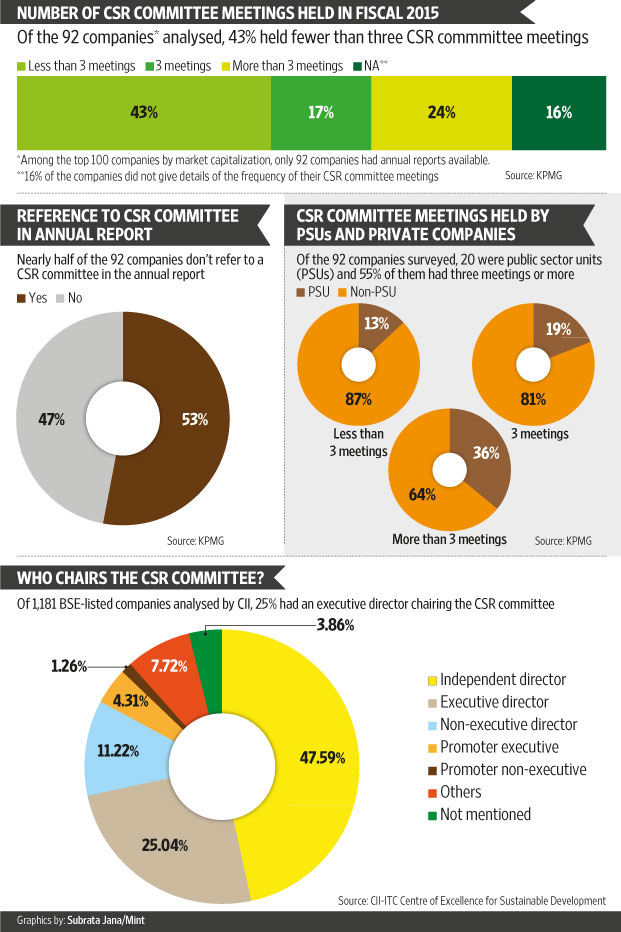CSR committees at some of the top 100 firms, including TCS, HUL and Maruti Suzuki, met only once.
The new companies law of 2013 took corporate social responsibility (CSR) from being a goodwill initiative to a boardroom staple, requiring firms to have a policy and strategy shaped by a CSR committee.
Yet, according to a KPMG India CSR survey, shared exclusively with Mint, in many of the top 100 companies by market capitalization, CSR committees met only once in the fiscal year ended March. Of the 100, annual reports of 92 companies were available.
As much as 43% of the 92 companies saw their CSR committees meet less than thrice during fiscal 2015, and some such as Tata Consultancy Services Ltd (TCS), Hindustan Unilever Ltd, Maruti Suzuki Ltd, Vedanta Ltd, Wockhardt Ltd and Yes Bank Ltd saw their CSR committees meeting once during the year.
Only about 24% of companies surveyed saw the committees meet more than three times during the year.
The companies law mandates that every firm needs to have a CSR committee that will formulate policy, decide on spending and also monitor the CSR activities of the company from time to time. But unlike the audit committee, which is mandated to meet four times during a year, the Act does not specify the frequency of the meetings of the CSR committee.
“For an important committee, meeting once in a quarter is ideal, especially in the initial years. If the committee is meeting only once a year, if there is any deviation from the original plan, it will take more time to react,” said Santosh Jayaram, head of CSR and sustainability at KPMG, a consultancy that advises many companies on their CSR strategy.
Wockhardt, Maruti Suzuki, Yes Bank and Vedanta’s spokespersons said that even though the companies’ CSR committees met only once in the entire fiscal year, they have separate teams to monitor activities under CSR and the boards are informed about these activities during every meeting.
“The committee decides the spend, and while it met once during FY15 (fiscal 2015), before every quarterly board meeting, the board is informed about the CSR activities,” said Huzaifa Khorakiwala, CSR committee member of Wockhardt and CEO of Wockhardt Foundation, which has been carrying out the company’s CSR activities for many years.
“We have an elaborate monitoring system and a strict due diligence mechanism is in place for all CSR projects, and the number of CSR committee meetings is not a limiting factor for the effective impact and scale of projects,” said Namita Vikas, chief sustainability officer at Yes Bank.
For most companies, this was the first time that their boards were getting involved in CSR and many of them also set up their committees late, so they probably didn’t have the opportunity to have more meetings, said KPMG’s Jayaram.
Companies such as Yes Bank, Wockhardt and Vedanta have said that in fiscal 2016, their CSR committees will be meeting more often.
“A board’s involvement is needed to monitor CSR more closely, so we will recommend that the CSR committee has more meetings,” said Wockhardt’s Khorakiwala.
Roma Balwani, president, group communications, CSR and sustainability, at Vedanta said its committee has already held a meeting, with a plan for more meetings in fiscal 2016.
Yes Bank is going one step further. “Board members are slated to travel to the project locations to get updates and ongoing feedback from the ground on implementation of the projects,” said Vikas.
A small but significant number of companies conducted over three committee meetings. ITC Ltd had five committee meetings during the year.
“This committee guides the company in embedding social and environmental objectives into its business strategies and assists in crafting unique models to support creation of sustainable livelihoods,” said Nazeeb Arif, executive vice-president, corporate communications, ITC.
And since most of the social interventions are a mix of medium- and long-term projects, the meetings of the CSR committee are held at appropriate intervals to fulfil their role and objectives, he added.
“It is a good idea to have more meetings. Unlike any other working committee, a CSR committee is driven by compliance. The risk is high because if there is any wrongdoing, the board members will be penalized,” said Abhishek Humbad, co-founder and director, NextGen, a Bengaluru-based CSR consultancy firm.
He added that it is in the interest of board members to make sure there are meetings and processes are in place for effective monitoring.
An encouraging aspect about CSR committees has been that many companies have assigned the chief executives or group heads as the head of the CSR committee as well.
For instance, TCS’s CSR committee is chaired by its group chairman, Cyrus Mistry. Similarly, ITC’s CSR chair is its chairman and managing director Y.C. Deveshwar.
Lobby group Confederation of Indian Industry in its annual CSR tracker report studied 1,181 BSE-listed companies, and even though 47% of the CSR committees are chaired by independent directors, 25% of committees were chaired by executive directors. Analysts think this is an indicator of management interest in CSR.
“This is a good sign. It shows that the senior management is setting the tone for CSR,” said Humbad.
This article was taken from here.
